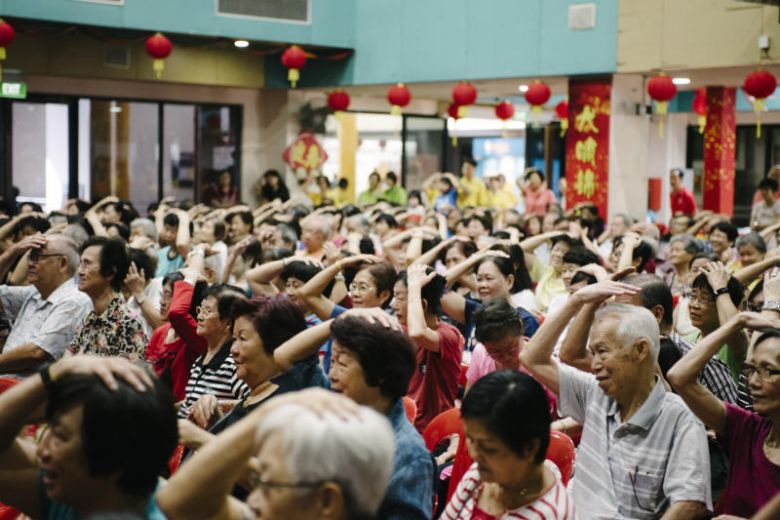Singapore is experiencing a demographic shift, with a growing ageing population that presents both challenges and opportunities. As life expectancy increases and birth rates decline, there is a pressing need to ensure that elderly citizens continue to lead fulfilling, healthy, and socially engaged lives. Volunteerism is a key component in addressing these challenges, fostering stronger intergenerational ties, and ensuring that seniors receive the care and support they need. A higher volunteerism rate can enhance social cohesion, reduce isolation among the elderly, and ease the burden on formal caregiving institutions. By encouraging a culture of giving back, Singapore can build a more inclusive and compassionate society that prioritizes the well-being of all its citizens.
Volunteerism Amidst An Ageing Population
In an article recently published by The Straits Times, Minister for Culture, Community, and Youth Grace Fu reiterated the importance of volunteering in an effort to create a caring and empowering environment for Singapore’s rapidly ageing population. As Singapore’s demographic landscape shifts, with an increasing proportion of elderly citizens, volunteerism plays a crucial role in ensuring social support systems remain robust and sustainable.
Singapore’s ageing population poses significant challenges, including increased demand for healthcare services, a shrinking workforce, and the need for greater social inclusion of seniors. By fostering a strong volunteer culture, the community can provide essential support to the elderly, reducing loneliness, promoting active ageing, and ensuring they remain engaged members of society. Volunteers can assist in areas such as eldercare services, medical aid, social interaction, and mobility assistance, helping to ease the burden on both family caregivers and institutional care facilities.
A higher volunteerism rate of 70% would help build stronger intergenerational connections, foster a culture of empathy, and provide much-needed assistance to the elderly in areas such as healthcare, daily living, and social engagement. Community-driven initiatives can help alleviate the pressure on formal caregiving services while enhancing the overall well-being of the ageing population.
This aligns with what we at Immigration@SG LLP (IASG) have been advocating to our clients—to strategise their Singapore PR / Citizenship application through active social integration. Beyond economic contributions, Singapore values individuals who actively participate in community-building efforts and contribute to the nation’s social fabric.
Social Integration Efforts for Singapore PR / Citizenship Applicants
Foreigners who wish to apply for Singapore PR or Citizenship may consider these initiatives as part of their social integration efforts:
-
Donations: Contributing to charitable organizations that support elderly care, healthcare, and welfare programs can demonstrate a commitment to Singapore’s social well-being.
-
Volunteering: Engaging in community programs such as befriending services for the elderly, assisting in senior activity centers, or providing pro-bono professional services can help build meaningful connections within local communities.
-
Mentorship: Offering guidance and support to younger generations, including students, young professionals, or start-ups, fosters a culture of shared knowledge and community support.
-
Corporate Social Responsibility (CSR): Businesses can implement CSR initiatives focused on eldercare, such as sponsoring wellness programs, supporting employment opportunities for seniors, or organizing outreach activities.
Singapore Government Initiatives for the Ageing Population
The Singapore government has introduced several initiatives to support and integrate the ageing population into society. These include:
-
The Action Plan for Successful Ageing: This national framework focuses on active ageing, lifelong learning, and improved healthcare access to ensure seniors lead fulfilling lives.
-
The Silver Support Scheme: A financial assistance program designed to help elderly Singaporeans with low incomes and little family support to meet their basic needs.
-
Community Networks for Seniors (CNS): A program that connects seniors with volunteers, healthcare professionals, and social service providers to promote active ageing and reduce social isolation.
-
Senior Employment Initiatives: Policies encouraging businesses to hire and retain older workers, including the raising of the retirement and re-employment age.
-
Dementia-Friendly Singapore: A nationwide effort to create dementia-friendly communities by training volunteers and providing resources for caregivers and individuals living with dementia.
-
Intergenerational Bonding Initiatives: Programs that encourage interaction between preschool children and senior citizens, fostering mutual learning and emotional connections. Activities include shared reading sessions, arts and crafts workshops, and music performances, which help bridge generational gaps and promote understanding.
These initiatives demonstrate the government’s commitment to fostering an inclusive society where seniors can continue to contribute meaningfully and enjoy a high quality of life.
Volunteering Activities in the Medical Sector for the Ageing Population
Given the increasing healthcare needs of Singapore’s ageing population, volunteering in the medical sector can make a significant impact. Examples of such activities include:
-
Medical Escort Services: Volunteers can accompany elderly individuals to medical appointments, ensuring they receive timely medical attention and support during their visits.
-
Hospital and Hospice Volunteering: Assisting in hospitals, hospices, or nursing homes by providing companionship, engaging seniors in recreational activities, and offering emotional support.
-
Home-Based Medical Assistance: Supporting home healthcare initiatives by helping seniors with medication reminders, simple health monitoring, and light caregiving tasks.
-
Physical Therapy and Wellness Programs: Volunteers with relevant expertise can conduct rehabilitation exercises, fitness sessions, or wellness workshops to promote mobility and active ageing.
-
Mental Health Support: Engaging in mental wellness initiatives such as dementia-friendly programs, befriending services for seniors with depression, and conducting cognitive stimulation activities.
The Future of Volunteerism in Singapore
With the government’s continued efforts to encourage civic engagement, there is a growing opportunity for individuals and organizations to step up and contribute meaningfully. Policies and incentives may further drive volunteer participation, making it an integral part of nation-building. A strong spirit of volunteerism not only benefits the ageing population but also strengthens social cohesion, fostering a Singapore that is inclusive, caring, and united for the future.







